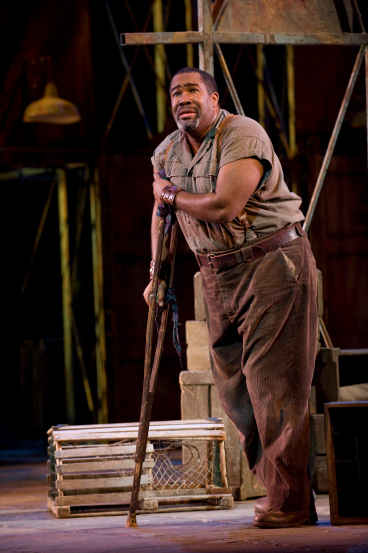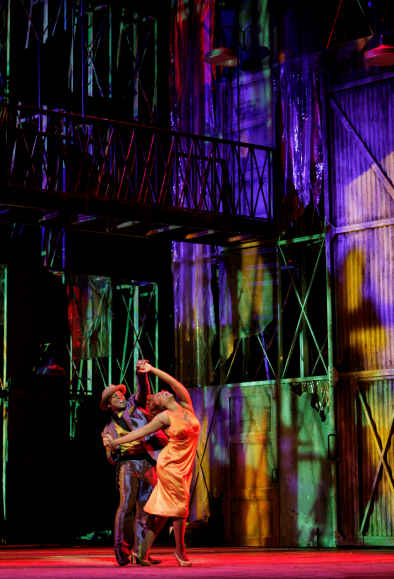Other Links
Editorial Board
-
Editor - Bill Kenny
-
Deputy Editor - Bob Briggs
Founder - Len Mullenger
Google Site Search
SEEN AND HEARD
INTERNATIONAL OPERA REVIEW
Gershwin, Porgy and Bess: Soloists, chorus and orchestra of San Francisco Opera, John DeMain, conductor, War Memorial Opera House, San Francisco. 24.6.2009 (HS)
Cast
Bess: Laquita Mitchell
Porgy: Eric Owens
Sportin' Life: Chauncey Packer
Crown: Lester Lynch
Clara: Angel Blue
Serena: Karen Slack
Maria: Alteouise deVaughn
Jake: Eric Greene
Mingo: Michael Bragg
Annie: Malesha Jessie
Strawberry Woman: Samantha McElhaney
Lily: Amber Mercomes
Robbins: Michael Austin
Crab Man: Ashley Faatoalia
Peter: Calvin Lee
Production
Conductor: John DeMain
Production/Director: Francesca Zambello
Associate Director: Rita D'Angelo Tikador
Set Designer: Peter J. Davison
Costume Designer: Paul Tazewell
Lighting Designer: Mark McCullough
Chorus Director: Ian Robertson
Choreographer: Denni Sayers

Eric Owens as Porgy - Picture © Terrence McCarthy
The current production of Gershwin’s Porgy and Bess concluding its run at San Francisco Opera revels in the scope and scale of grand opera, the oversized emotions and big gestures, both musical and dramatic, that make the blood rush when opera takes wing. For the most part, conductor John DeMain got all that from a sumptuous cast and a revved-up San Francisco Opera orchestra without losing the essential jazziness of Gershwin’s music, which segues seamlessly from 1930s dance beats to the sweep of a full-throated aria, and the orchestral thrusts that draw out those big emotions.
As Porgy, bass Eric Owens, last seen here as General Leslie Groves in John Adams’ Doctor Atomic, dominated the cast. He just got stronger of voice and more powerful of stage presence as the evening progressed. A big man, both tall and broad, he was utterly believable as a game-legged cripple with the upper-body strength to best his rival in a knife fight. He also has the tenderness of body language to make his duets with Bess feel special, and the velvet in the voice to bring a catch to the throat when, in the final scene, his sang the first line of “Oh Lord, I’m on my way” with a perfect mixture of pathos, wonder and resolve.
In this production, borrowed from Washington National Opera, Porgy eschewed the goat cart, instead hobbling on a makeshift crutch as he dragged one leg, a theatrical decision that made for more physical options in the love scenes with Bess and other interactions with the cast. It also created a heartbreaking final tableau as he limped across the stage into the light streaming from an opened door, disappearing on the final chord.
The unit set put Catfish Row in what appeared to be an old wharf building made into a tenement. Stripped of the walls, it became Kittiwah Island amusement park (the “K” having fallen in the sand) for the picnic scene. Porgy’s hovel was a two-sided frame, a bed and a table, moved onstage as needed by the cast. It worked seamlessly, allowing the music to flow. Several times DeMain cut off applause to keep things flowing.
This cast, however, could have performed on a bare stage and would have conveyed the story with no trouble at all. From the title characters to the smallest walk-ons, as actors they grabbed the characters and ran with them. Every word of dialog counted.

Bess (Laquita
Mitchell) and
Sportin' Life (Chauncey Packer)
Picture © Cory Weaver
As Bess, Laquita Mitchell (who has sung Clara in productions of Porgy and Bess at Los Angeles Opera, Washington National Opera, and Paris’s Opéra Comique) created a full-bodied, full-blooded woman conflicted by her freewheeling past and tender feelings for Porgy. Everything about her, including her sound, was voluptuous and compelling. Her body language was totally right as she alternately taunted and cringed at the “church-going women” of the community, as she fought off an old flame come to reclaim her, and as she warmed to Porgy. The duets with Porgy, “Bess, you is my woman now” and “I loves you, Porgy,” gripped the soul.
Although all the voices rang with gorgeous sound, some of the singers did better than others at finding the elusive common ground between opera and Gershwin’s jazzy style. Aside from Owens, the most impressive was Chauncey Packer as Sportin’ Life, the “happy dust” dealer who also lusts after Bess, bides his time, and eventually spirits her off to New York. Without the benefit of amplification, Packer made his clear, bright tenor dance its way seamlessly through all of the character’s star turns, including a joyous romp with “It ain’t necessarily so” and later in “There’s a boat dat’s leavin’ soon for New York.”
Less impressive were Karen Slack’s Serena and Alteouise deVaughn’s Maria, the two leaders of the community’s women. There was an unfortunate disconnect between the straight operatic singing of, and their perfectly pitched dialect for the dialog. Angel Blue as Clara sang prettily, but missed the jazz sway of “Summertime.” Mitchell’s reprise of that song in the final act got it right.
Samantha McElhaney’s small but vivid turn as the Strawberry Woman in the final act’s Catfish Row scene-setter, gorgeously sung, marked her as someone who could have charmed even more as Clara. As Crown, Bess’s man before Porgy, Lester Lynch displayed the swagger and the rippling chest muscles to convince us that he’s someone who could win back Bess on animal magnetism (aided by a couple of packets of “angel dust”).
The chorus, as important to this opera as it is to Britten’s Peter Grimes or Mussorgsky’s Boris Godunov, brought their individual characters to life with splendid singing and great stage presence. Finally, the orchestra managed to play Gershwin’s music with the requisite sweep while swinging effortlessly on the jazzy phrases.
The totality, compelling and mesmerizing, put an exclamation point on the opera company’s 2008-2009 season.
Harvey Steiman
Back to Top
Cumulative Index Page
